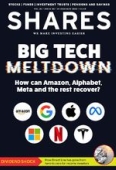Archived article
Please note that tax, investment, pension and ISA rules can change and the information and any views contained in this article may now be inaccurate.
Investment trust bargains: 3 stocks to buy now

Optimism that the UK economy may not be as weak as once feared has lifted numerous UK stocks so far in 2023. Yet many investment trusts continue to trade at wide discounts to their net asset values – both relating to UK stocks and overseas ones. It means their share prices are worth less than the value of the investments in their portfolios.
According to Winterflood data, the average investment trust sector discount widened significantly during 2022 from 2.5% to 13.4%.
Even now, after the FTSE 100’s New Year rally, several trust geographical niches are trading at larger discounts than their 12-month average. For example, the flexible investment sector, which includes capital preservation funds like Ruffer Investment Company (RICA) and Capital Gearing Trust (CGT), stands at an 18.2% discount to net asset value versus a 12-month average of 15.8%.
It’s a similar story for the UK All Companies, Europe, North American, North American equity income and Asia-Pacific sectors.
The same goes for industry-specific investment sectors. That technology is on a 17.5% discount versus 12-month average of 16.7% probably won’t shock readers, but areas of the market that have been in stronger demand like healthcare and natural resources are in the same boat.
IS ANYTHING ON A DISCOUNT A GOOD INVESTMENT?
Such discounts can be tempting to retail investors on the lookout for bargains, and we believe there are plenty to be found, but one needs to tread carefully.
Investment trusts that focus on hard-to-value assets like property or private companies can be particularly volatile during spells of uncertainty. Such assets are valued infrequently, so the reported discount may be based on a stale valuation.
It’s never a good idea to make decisions that are purely based on the size of asset value discounts, and this is even more important to remember when markets are experiencing heightened volatility.
‘Discounts are currently wider than usual, and this can present buying opportunities,’ says Annabel Brodie-Smith, communications director at the Association of Investment Companies. ‘However, investors need to consider whether an investment company’s strategy meets their objectives. They also need to take into account other factors, such as the investment company’s performance record, charges and gearing. If investors are in any doubt, they should speak to a financial adviser.’
AREAS WITH BIGGER DISCOUNTS
As the Winterflood numbers show, discounts vary by region depending on sentiment, the nature of shareholder registers, discount controls and performance. ‘Discounts have historically tended to be widest in sectors where the shareholder register is dominated by institutions, such as emerging markets or Asia, as these investors tend to sell if the discount tightens, which means that retail flows have less impact on ratings,’ say investment company analysts at broker Numis Securities.
But they also believe the macroeconomic backdrop is currently a big driver of discount levels with retail and institutional investors wary of the outlook, particularly around once-hot sectors like technology and smaller companies – which often include young companies with little or no profit track record to rely on, meaning they are currently among the widest discounts.
The Global Smaller Companies sector trades on a 15.7% discount, based on Winterflood’s data, against a 12-month average of 14.2%.
‘2022 was a difficult year for the technology sector and hopes of a Santa rally were dashed with the Nasdaq down circa 8% in December, in sterling terms, as investors continue to weigh up the impact of higher rates on tech stocks,’ says Numis. ‘Smaller companies, particularly non-profitable ones without near-term earnings prospects, were the target of the market sell-off.’
Recent weeks have seen share price weakness extend to larger cap companies such as Tesla (TSLA:NASDAQ), Amazon (AMZN:NASDAQ) and Salesforce (CRM:NYSE) struggling.
‘In January 2023, Tesla sold off on the back of missing order estimates, whilst Salesforce and Amazon became the latest companies to announce plans to reduce their workforce,’ comments Numis.
‘Clearly the technology sector is not immune to worsening macro conditions and there is likely to be spend scrutiny in the medium term, but they are well placed to continue to grow their revenues faster than other sectors due to continued innovation and the ability of software to deliver efficiencies,’ it adds, suggesting that a lot of the risks facing the sector have now been priced in.
NEW DAWN FOR UK SHARES
Fund managers and analysts have been calling the bottom for relatively poor performance of UK markets for several years, without much luck. Richard Buxton, a fund manager at Jupiter, believes UK shares are so cheap that ‘further material declines are unlikely’.
He notes the UK equity market has materially underperformed other equity markets in recent years – a result of Brexit, a value bias to unpopular sectors and persistent net selling.
‘In a historical context, UK equities look very attractively valued,’ Buxton says. Numis agrees, believing that years of underperformance makes the UK a potentially attractive market. ‘Most investors have been allocating more globally in recent years, but we believe there may be value in UK exposure, particularly given the risk that a period of sterling strength could negatively impact overseas exposure.’
Numis sees a pick-up in mergers and acquisitions as a potential route to crystallising some of this value.
China’s equity market has also been attracting investor and analyst interest after the fallout from government Covid-19 policy, a regulatory clampdown on technology companies, and issues with overleveraged property developers. There is now renewed hope for recovery with the zero-Covid policy now being reversed.
Despite the recent recovery, Chinese equities trade at a rough 45% discount to developed markets and versus an average of circa 30% since 2010.
THREE BARGAIN INVESTMENT TRUSTS TO BUY NOW
Fidelity Special Values (FSV) 285p
Discount 5.9% (12-month average: 4.3%)
Fidelity Special Values has seen its discount narrow somewhat in recent weeks, but manager Alex Wright is highly rated with good reason.
He has a contrarian approach, looking for unloved stocks where the downside is limited and there is a catalyst for change. Current holdings include Serco (SRP), Imperial Brands (IMB) and Aviva (AV.).
Finsbury Growth & Income (FGT) 868p
Discount 6.3% (12-month average: 5.2%)
Finsbury Growth & Income delivered a net asset value total return of 165% over 10 years compared with 91% for the FTSE All-Share. But the past two years have been harder with its NAV and share price significantly underperforming both its benchmark and the UK equity income peer group.
This can be attributed to the UK market’s preference for more cyclical, value stocks as well as some stock-specific issues, but manager Nick Train remains popular managers with retail investors thanks to a consistent, focused investment approach. A common feature of companies in the portfolio is pricing power which is a big advantage during these inflationary times. Holdings include Diageo (DGE), RELX (RELX) and London Stock Exchange (LSE).
JPMorgan Emerging Markets (JMG) 117.8p
Discount 6.6% (12-month average: 9.7%)
JPMorgan Emerging Markets provides core exposure to global emerging market equities and comes with a strong long-term performance record. It has outperformed its benchmark, the MSCI Emerging Markets index, and the global emerging markets peer group over the last three, five and 10-year periods. The trust is characterised by its emphasis on high-quality growth companies, which we believe allows it to outperform over the long run.
Manager Austin Forey has plenty of experience and can tap into the deep resources of JPMorgan Asset Management.
It’s worth noting the trust’s active share buyback programme, with £16.4 million of shares bought back last year, which should offer a degree of downside protection.
Investors may be unfamiliar with some of the names in the portfolio, but it has large stakes in better-known ones that include TSMC (2330:TPE), AIA (1299:HKG) and Tencent (0700:HKG).
DISCLAIMER: The author of this article (Steven Frazer) has a personal investment in Ruffer Investment Company.
Important information:
These articles are provided by Shares magazine which is published by AJ Bell Media, a part of AJ Bell. Shares is not written by AJ Bell.
Shares is provided for your general information and use and is not a personal recommendation to invest. It is not intended to be relied upon by you in making or not making any investment decisions. The investments referred to in these articles will not be suitable for all investors. If in doubt please seek appropriate independent financial advice.
Investors acting on the information in these articles do so at their own risk and AJ Bell Media and its staff do not accept liability for losses suffered by investors as a result of their investment decisions.
Issue contents
Feature
Great Ideas
Investment Trusts
News
- Marks & Spencer builds on sparkling Christmas with news of 20 new stores to come
- Darktrace back to IPO price after slicing growth expectations
- UK stocks enjoy big gains as travel and retail lead the way
- Housebuilder warnings about a slowdown in activity does not bode well for suppliers
- Musicmagpie shares soar more than 300% from October lows

 magazine
magazine








